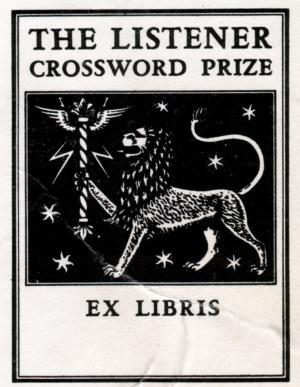![[Image]](listen.jpg)
![[Image]](listen.jpg)
The Listener magazine was founded by the BBC in 1929 as a review of radio programmes. In April 1930, two months after The Times, The Listener published its first crossword puzzle. This first , on 2 April 1930, initiated the long line of special theme puzzles. Mr I Cresswell of 40 Hamilton Road, Colchester, was the only entrant to submit a correct solution to this 'musical' crossword.In the early years there were many such special themes, such as music, science, foreign languages, botany and the motor car. At first the diagrams were large and, although blocked grids did appear, the barred pattern soon became the standard.
In the early years prizes of books were given to all correct solutions, and although one week there could be up to a dozen winners, in another there might be none. In recent years the average number of correct submissions is about 200, except for the occasional poser, such as No 2419, Missing Faces by Ad which got only 29 entries of which 20 were incorrect, or Lip Service by Leon (1980) which had no correct entries! The Prebendary A F Ritchie (Afrit) was one of the early stars. His puzzles were extremely difficult, with asymmetric grids, split words, unchecked pairs and reversals, while his clues were full of obscure references to classical literature and the Bible. He published his first 'Printer's Devilry' puzzle on 2 June 1937. Among the early setters was Ximenes (Derrick MacNutt), who wrote under the name Tesremos (a reversal of his middle name) and L E Eyres, who as Pollux composed 34 Latin or Greek crosswords between 1934 and 1948.
During the 2nd World War the Listener crossword continued, though in a much easier form. After the war Afrit returned and so did the difficult puzzles. Many more crossword setters submitted their puzzles with few getting more than one or two published each year. Many will remember the names of Jeffec, Sumydid, Log, Dogop, ffancy, Babs, Klick and Sabre. Alec Robins, under the name of Zander, created his own special themes, publishing many editions of his Sixes & Sevens, Cook's Tour & Justyn Print, among others.
In 1979 The Listener celebrated its 50th anniversary and in May there was a crossword jubilee with the publication of No.2500 -Floreat in Aeternum. The preamble began - 'In honour of this landmark in its history, THE LISTENER presents this puzzle which comprises a diagram composed by Ploutos, with five elements, each one clued to a well known pattern by one of the regular setters of recent years.' The grid was in the shape of an 'L', composed of 5 12x12 grids. The five elements were;1. Diametricode by Babs; 2. Alphabetical Cocktail by Sam; 3. Play Quiz by Apex; Topped and Tailed by Klick; 5. Sixes and Sevens by Zander. The hidden message read: 'The Listener Crossword Celebrates Two Thousand Five Hundred : Geshundheit.' Solvers were given over a month to complete the puzzle but, in error, the solution was printed in the edition preceding the closing date.
During the 70s and 80s Apex (Eric Chalkley) composed the most accessible puzzles, often with his trade-mark perimeter messages in a grid lacking the 4 corner cells. Sabre was usually impossibly difficult and the 2 or 3 mathematical puzzles (notably by Rhombus) received letters of complaint from the word-loving solvers. Towards the end of the 80s dwindling sales made The Listener an economic liability, and although for a short time it was published on glossy paper, it was to fold in 1991. Fortunately the chronological order of the puzzles was maintained when The Times took over the puzzle, starting with no. 3090 on 23 March 1991 and continues to publish it every Saturday, recently recording no. 3500. In the nineties Mike Rich (Ploutos) continued to edit the puzzle, with co-editor Ross Bereford, who started in 1994 when John Grimshaw (Dimitry) retired. The sudden death of Mike Rich in March 2002 was a huge loss. Derek Arthur took over the role of vetter. Ross test-solves all the puzzles for the first time, then passes a selection on to Derek who tries them again and does the scheduling, proof-reading and other liaison with The Times. John Green maintains an impressive database of entries, solvers and solutions.These statistics are available to solvers each year, on receipt of a stamped addressed envelope. In the 1998 season the greatest number of correct entries was for no. 3477 A Harrowing Time by Polymath (1,234 of which 1,078 were correct), the least number was for no. 3470 Rum Journey by Aragon (158, of which 101 were correct) and the average number of correct entries is 441.Many thanks to John Green and Ross Bereford for correcting this information.
